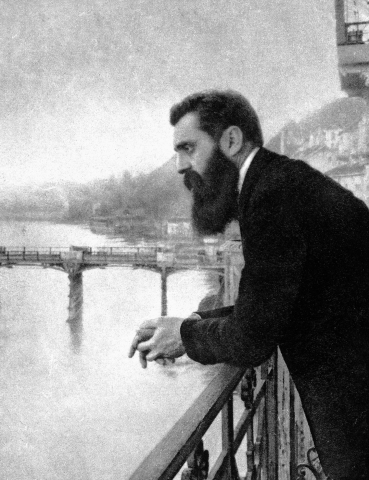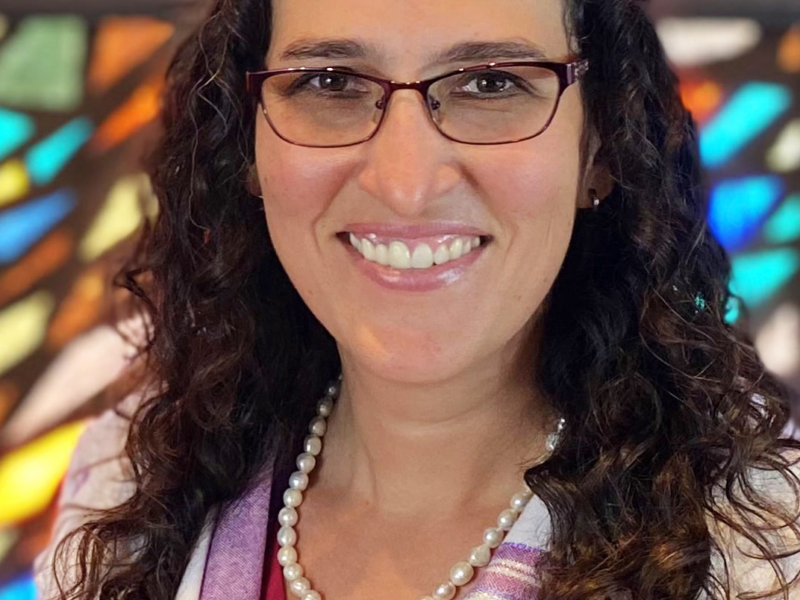“It is No Dream: The Life of Theodor Herzl” smacks us at the outset with color images of vandalized tombstones and neo-Nazi marches. This brief but jarring sequence, accompanied on the soundtrack by a passage from “Der Judenstaat,” the Zionist visionary’s momentous 1896 argument for a Jewish homeland, aims to nail two birds with one stone.
The first, plainly, is to assert the ongoing necessity in our own time for a safe haven for Jews. More subtly — and this is the challenge of every historical documentary — “It is No Dream” is alerting audiences that its subject, who died in 1904, is of contemporary relevance.
The latest feature-length documentary from Moriah Films, a division of Rabbi Marvin Hier’s L.A.-based Simon Wiesenthal Center, “It is No Dream” is solidly made and of substantial educational value. It is also staid and formulaic — relying heavily on narration ponderously intoned by Sir Ben Kingsley — when it could have been galvanizing. By choosing to focus on one man’s biography rather than exploring the birth of a movement, Rabbi Hier and director Richard Trank sacrifice dramatic tension as well as intellectual heft.
Born in Budapest in 1860, Herzl was raised an assimilated urbanite with little exposure to Jewish religion, ritual or culture. His family moved to Vienna as he was finishing high school, and he had his first brush with anti-Semitism at the University of Vienna.
Hertzl studied law, but with limited possibilities for Jews to advance, he gravitated to writing. Although he had a play staged in New York and two produced in Vienna, he enjoyed much greater success as a young journalist for Neue Freie Presse. The Viennese paper rewarded Herzl in 1891 by dispatching him to Paris, the European capital of modern thinking, as its foreign correspondent. This was a plum assignment, and it led directly to Herzl’s date with destiny.
The 1894 trial and conviction of Capt. Alfred Dreyfus for passing military secrets to Germany, and the ensuing anti-Semitic demonstrations in enlightened Paris, of all places, stunned Herzl. His indifference to his Jewish identity — akin to that of the wicked son at the seder — evaporated with the recognition (fueled by anti-Jewish incidents in Berlin, Vienna and Prague) that the rising hatred and scapegoating of Jews in Europe inevitably included him. (The lengthy section on the Dreyfus affair in “It is No Dream” whets the appetite for “D,” the fact-based political thriller Roman Polanski is preparing to shoot.)
Herzl came to realize that Dreyfus was innocent, and the truth eventually did emerge that the Jewish officer had been blamed and framed for another man’s treason. However, the Jewish question now preoccupied Herzl, and he laid out his answer in “Der Judenstaat.”
“It is No Dream” obsessively follows Herzl’s monomaniacal campaign to relocate Europe’s Jews to Palestine (after he initially proposed Argentina). He lobbied wealthy Jews, like the Baron Rothschild, with a proposal to pay off the debt of the Ottomans in exchange for Palestine. While the Jewish upper crust and Europe’s major rabbis were opposed to a Jewish state — at the first Zionist Congress in Basel in 1897, Herzl was compelled to say, “Judaism has nothing to fear from the Jewish state” — ordinary Jews from Vilna to Krakow embraced Herzl’s dream. Those at the bottom naturally have the least to lose and the most to gain.
Herzl eventually secured a meeting in Palestine with the head of the Ottoman Empire. Rebuffed by the Kaiser, Herzl initiated discussions with the British, who suggested a Jewish state in Uganda. Herzl rejected the idea, then reversed himself just months later after the terrible 1903 pogrom in Kishinev, Russia. Convinced that an imperfect, interim plan for relocating Europe’s Jews was better than no action, Herzl proposed Uganda at the next Zionist Congress, only to be hooted down. Those who called him Moses were correct in one respect: He didn’t live to see the Promised Land.
Herzl was just 44 when he died from overwork, stress and a heart permanently weakened by a previous bout of malaria. Despite the fact that “It is No Dream” skips over the ways in which Israel has evolved since 1948 (as expected, but this leaves plenty of room for post-film discussion), the documentary depicts a remarkable man, and reminds us that the Jewish state will always be his legacy.
“It is No Dream: The Life of Theodor Herzl” opens Friday, Oct. 26, at the Harkins Shea 14 in Scottsdale.





